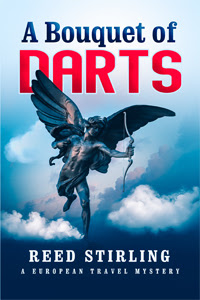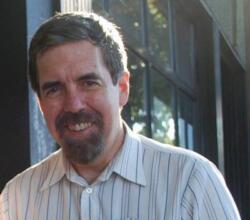A god at play
A Bouquet of Darts: A European Travel Mystery
by Reed Stirling
Drayton Valley: BWL Publishing, 2024
$18.99 / 9780228631309
Reviewed by Sheldon Goldfarb
*

What to make of this novel? It advertises itself as a mystery, but there is no mystery. Its back cover blurb talks of a body, but you wait and wait for the body–and you will wait a long time. Before that you accompany a group of tourists cycling through Holland, which oddly is the same setting as the one in the Vancouver Island-based author’s previous novel, The Palimpsest Murders, where there is also a long delay before a body shows up, and which also delights in classical references.
The classical references in the current novel are its best part, and they aren’t just references; this time the narrator is not a member of a tour, he is not even human, he is the Greek god Eros–not to be confused with Cupid, his Roman counterpart. No, no, says Eros, don’t mistake me for that puny infant (puny in all sorts of ways, he assures us); I am the great god Eros, lord of love and desire, with arrows to inspire lust (or kill it, if he so chooses).
Eros intrudes in the story at great length, and often it is a relief. The human characters seem colourless and banal, from the cartoonish leering boor Ray Rudiger to the indistinguishable twins Tim and Tom to the backward little boy Benny (autistic?) to Ray’s long-suffering wife. There’s a glimmer of distinctiveness in the two young women on the trip, the gorgeous Candace and her plainer cousin Isla, a poet with whom both Tim and Tom fall in love, thanks to Eros’s darts.

The story such as it is–but there really is no story. The tourists (far too many of them) cycle around Holland visiting tourist attractions, falling in and out of love, confessing some dark secrets, disagreeing about politics, or talking about the weather in Vancouver (a couple of them are from British Columbia, and one sports a BC Lions cap). And all of this leads nowhere in particular.
That said, it’s a sort of pleasant cotton candy sort of book; or no, that makes it sounds too sweet, but it does vanish quickly like a cotton candy treat. And the real treat is Eros, whom the author is able to make into the one believable interesting character. You begin to wonder what he’s doing here, overseeing this group of aimless tourists; he deserves a better book to be in, with all his musings about philosophy and myth. He even has a paradoxical claim to make at the end, saying that all the gods are just reflections of us: but if, in the context of the novel, he is real, what can that mean? It’s like one of those books in which a character turns out to be the author, but the reverse of that: in this case the author of what is going on, the shooter of darts who causes us to fall in love, is in fact just a manifestation of our consciousness. Perhaps this is something to be explored in another novel, one not burdened by an imaginary mystery among Dutch-bound cyclists.
Myth is the only truth, says Eros, echoing Jung, and perhaps we would be better served by a novel that focused more on myth and less on boring humans. Perhaps Reed Stirling should have written a pure fantasy novel, something like Roger Zelazny’s Lord of Light. Let us sport among the gods and leave the mortals to their bicycles.

*

Sheldon Goldfarb is the author of The Hundred-Year Trek: A History of Student Life at UBC (Heritage House, 2017), reviewed by Herbert Rosengarten. He has been the archivist for the UBC student society (the AMS) for more than twenty years and has also written a murder mystery and two academic books on the Victorian author William Makepeace Thackeray. His murder mystery, Remember, Remember (Bristol: UKA Press), was nominated for an Arthur Ellis crime writing award in 2005. His latest book, Sherlockian Musings: Thoughts on the Sherlock Holmes Stories (London: MX Publishing, 2019), was reviewed in The British Columbia Review by Patrick McDonagh. Originally from Montreal, Sheldon has a history degree from McGill University, a master’s degree in English from the University of Manitoba, and two degrees from the University of British Columbia: a PhD in English and a master’s degree in archival studies. [Editor’s note: Sheldon Goldfarb has reviewed books by Bill Arnott, paulo da costa, Chris Honey, Andrew Platten, Marcello Di Cintio, R. F. Vincent, and Nick Marino for BCR and contributed a comedic poem, “The Ramen,” based on Poe’s “The Raven.”]
*
The British Columbia Review
Interim Editors, 2023-26: Trevor Marc Hughes (non-fiction), Brett Josef Grubisic (fiction and poetry)
Publisher: Richard Mackie
Formerly The Ormsby Review, The British Columbia Review is an online book review and journal service for BC writers and readers. The Advisory Board now consists of Jean Barman, Wade Davis, Robin Fisher, Barry Gough, Hugh Johnston, Kathy Mezei, Patricia Roy, and Graeme Wynn. Provincial Government Patron (since September 2018): Creative BC. Honorary Patron: Yosef Wosk. Scholarly Patron: SFU Graduate Liberal Studies. The British Columbia Review was founded in 2016 by Richard Mackie and Alan Twigg.
“Only connect.” – E.M. Forster